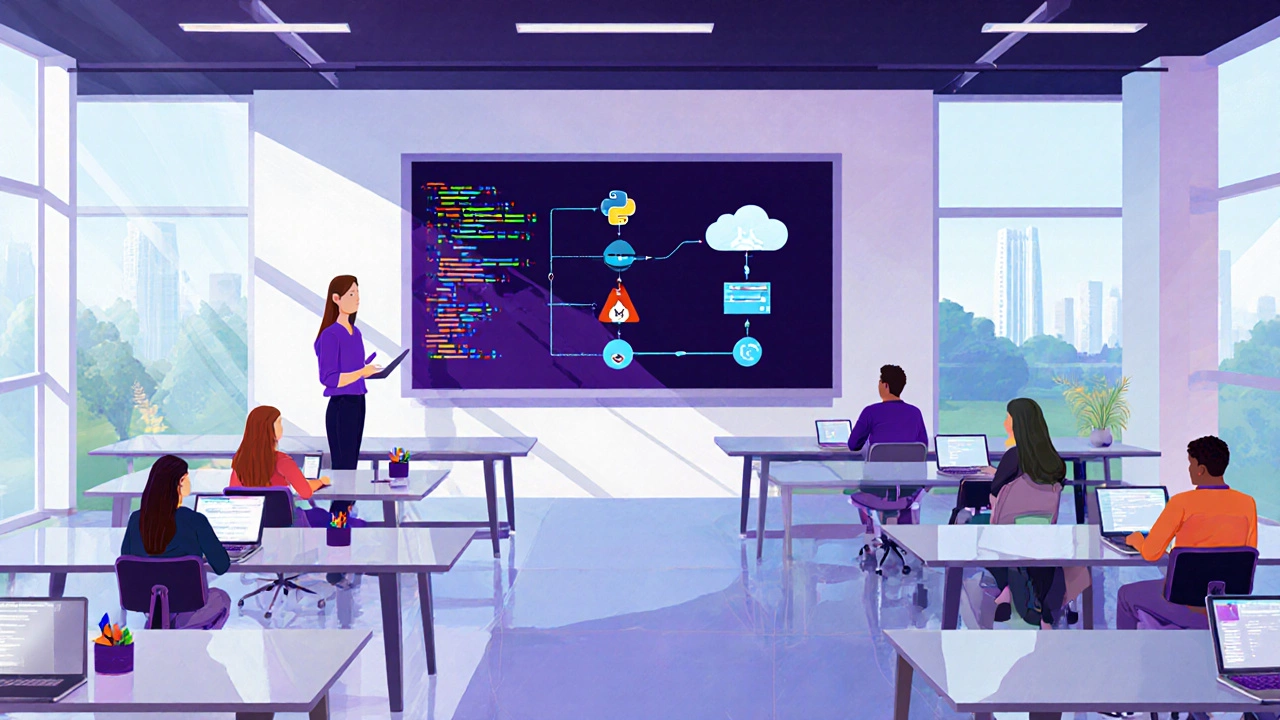Career Path Calculator
Find Your Perfect Course Match
Answer a few questions to get personalized recommendations for the most in-demand computer courses in India for 2025
Recommended Courses for You
Key Takeaways
- Data Science and AI lead the demand charts, with salaries crossing ₹12‑15 lakhs per year.
- Full‑Stack Development and Cloud Computing follow closely, offering quick entry points after 3‑6 months of study.
- Cybersecurity specialists are scarce, pushing salaries above ₹14 lakhs despite longer certification tracks.
- Choosing a course aligns with your career timeline, preferred tech stack, and regional job hubs like Bengaluru, Hyderabad, and Pune.
- Hands‑on projects and recognized certifications matter more than course duration alone.
Computer courses in India are the gateway to the country's booming IT sector. With the high demand computer course label becoming a buzzword among recruiters, job seekers wonder which programs actually translate into real‑world offers. This guide breaks down the latest market data, highlights the top five courses that recruiters are hunting for in 2025, and gives you a practical checklist to pick the right path.
Understanding the Indian IT Job Landscape
The IT services market in India is projected to hit $350 billion by 2026, according to NASSCOM. That growth fuels a relentless appetite for skilled talent. Recent job portals like Naukri.com and LinkedIn report a 22 % year‑on‑year rise in postings for roles tied to data, cloud, and security. Regions such as Bengaluru, Hyderabad, Pune, and the Delhi‑NCR corridor dominate the hiring map, hosting a concentration of tech hubs and multinational R&D centers.
Employers now look beyond generic “computer science” degrees. They demand niche expertise that can be demonstrated through project portfolios, certifications, and hands‑on labs. Below we map the most visible demand signals to specific course offerings.
Top 5 High‑Demand Computer Courses in 2025
We've filtered the data through three lenses: average salary, number of active job postings, and the prevalence of industry‑approved certifications. The result is a shortlist that consistently appears at the top of recruiter surveys and hiring dashboards.
| Course | Average Salary (₹ lakhs/yr) | Jobs Posted (Jan‑Jun 2025) | Typical Duration | Popular Certification |
|---|---|---|---|---|
| Data Science | 14‑15 | 12,800 | 4‑6 months | PGP‑DS by IIIT‑B |
| Artificial Intelligence | 13‑15 | 10,500 | 5‑7 months | AI‑ML Engineer by NPTEL |
| Full Stack Development | 9‑11 | 9,200 | 3‑5 months | Full‑Stack Web Dev - Coursera |
| Cloud Computing | 10‑13 | 8,900 | 4‑6 months | AWS Solutions Architect |
| Cybersecurity | 13‑14 | 7,400 | 6‑9 months | CEH - EC‑Council |
Notice how Data Science and AI command the highest salaries, while Full‑Stack Development offers the quickest entry due to its shorter duration and abundant freelance opportunities.

How to Choose the Right Course for Your Career
- Assess your timeline. If you need a job in under six months, Full‑Stack Development or Cloud Computing bootcamps are pragmatic.
- Identify the tech stack you enjoy. Data‑heavy roles require Python, R, and SQL; cloud roles need AWS, Azure, or GCP.
- Check certification credibility. Courses partnered with recognized bodies (e.g., NASSCOM, ISB, Coursera) carry weight with recruiters.
- Factor in geographic preference. Bengaluru and Hyderabad have a higher concentration of AI startups, while Pune leans toward cybersecurity firms.
- Look for hands‑on projects. Employers often request a GitHub portfolio or a live demo as part of the interview.
Skills Employers Look For Beyond the Certificate
While a certificate opens the door, these supplemental skills keep you moving forward:
- Python Programming - the lingua franca for data, AI, and automation.
- Version control with Git - essential for any collaborative development.
- Understanding of RESTful APIs - critical for full‑stack and cloud engineers.
- Basic DevOps concepts - containers (Docker) and CI/CD pipelines are now baseline expectations.
- Soft skills: problem‑solving, communication, and the ability to translate technical jargon for non‑technical stakeholders.
Common Pitfalls and How to Avoid Them
Many aspirants enroll in popular courses but stumble later. Here are the most frequent mistakes and quick fixes:
- Choosing hype over substance. Not every “AI” label guarantees depth. Verify the syllabus includes linear algebra, statistics, and model deployment.
- Skipping the capstone project. Employers love to see a real‑world application. If your course lacks a final project, build one on your own.
- Ignoring soft skill development. Technical prowess alone won’t land senior roles; practice interview storytelling.
- Neglecting continuous learning. Tech evolves fast. Subscribe to platforms like Udemy, Pluralsight, or O’Reilly for post‑course updates.
Next Steps: Building Your Roadmap
Take a moment to map your current skill set against the table above. Identify gaps, pick a target course, and commit to a 90‑day action plan:
- Enroll in a reputable bootcamp or online program.
- Set weekly milestones (e.g., “Complete Python basics in week 2”).
- Build a portfolio piece every month and push it to GitHub.
- Attend local meetups or virtual webinars in your chosen field.
- Apply to at least five relevant job postings each week once you have a project demo.
Following this structured approach turns the abstract idea of a “high demand computer course” into a concrete career move.
Which computer course offers the fastest entry into the job market?
Full‑Stack Development typically requires 3‑5 months of intensive training and equips you with both front‑end and back‑end skills, allowing you to start freelancing or land junior developer roles quickly.
Do certifications really matter for data science roles?
Yes. While a strong portfolio is crucial, certifications from recognized institutes (like the PGP‑DS by IIIT‑B) signal that you have covered core concepts and can be trusted with business‑critical data projects.
Is cloud computing more suitable for engineers with a networking background?
A networking background helps, but most cloud courses start with fundamentals of virtualisation, storage, and IAM, making them accessible to graduates from any IT discipline.
What is the average salary increase after completing a cybersecurity certification?
On average, professionals see a 30‑35 % boost, moving from around ₹9 lakhs to ₹13‑14 lakhs per year, according to recent salary surveys on Indeed and Glassdoor.
Can I transition into AI without a formal degree?
Absolutely. Many successful AI engineers start with online courses, build a portfolio of models, and obtain certifications like the NPTEL AI‑ML Engineer. Real‑world project experience often outweighs a traditional degree.





Write a comment